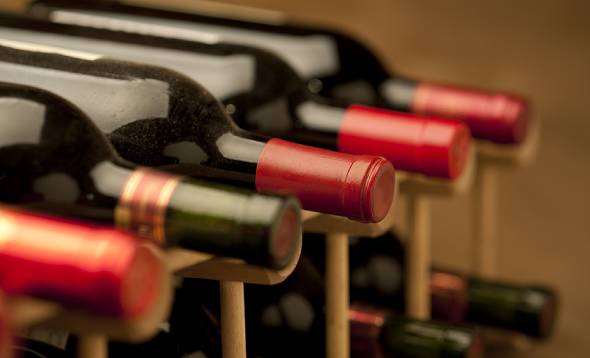That organic living is a conscious health choice
Alcohol or a Healthy Lifestyle - Do We Have to Choose?
For many, a glass of red wine, an exotic mixer or a flute of bubbly is the perfect remedy for a stressful day or what makes any festive event merrier.
With its many pleasurable associations – the pop of a bottle, the clinking of glasses and Happy Hour – it’s tempting to overlook alcohol’s less-than-positive health effects. Alcohol is, indeed, a toxin. When consumed on occasion and in moderation, the body is usually able to process and clear it.
However, the system suffers when tolerable limits are exceeded. The immediate effects? Hangover symptoms - like fatigue, nausea and a throbbing head - develop. In the long-term, risk of a number of chronic diseases rises.
Is it possible to continue sipping while reducing alcohol’s burden on well-being? Absolutely! Here are some drinking tips to help you hold onto your health goals, without letting go of your cocktail.
Before you pour
1. Hydrate
The main detoxifying organs – the liver and the kidney – require ample fluids to break down and clear out all toxins, alcohol included.
2. Pre-nibble
A light snack prior to a night of drinking can protect your stomach and improve your tolerance. Alcohol – along with many ingredients (lemon, lime, juice, soda) that it’s commonly combined with – are acidic. When mixed with stomach acids, it can set your system off in the wrong direction. Likewise, drinking on an empty stomach can hasten and increase alcohol’s intoxicating effects.
3. Move
If it’s unlikely that you’ll feel inclined to exercise the day after drinking, fit in a workout beforehand. This ensures you stay on track with your fitness regime. Working out also helps to offset the extra calories from drinking.
As you sip
1. Keep count
Once you get started, it’s easy to lose track of how many cocktails you’ve consumed. Consider setting a limit in advance and keep within it.
2. Choose carefully
The system struggle with some drinks more than others. Here are a few of the usual suspects:
• Tummy- troublers
Thanks to a mix of yeast, bubbles and carbohydrates, beers commonly cause belly bloat. Which are the worst? Darker, heavier brews. So, stick with lighter pilsners and drafts when you can. The fruit sugar fructose - from the fermented grapes - can cause gastrointestinal upset for individuals who are more sensitive, too.
• Head-achers
The production of many liquors and wine requires fermentation. This process produces congeners - chemicals that enhance flavour and aroma, and often darken the color of the finished product. Some manufacturers add congeners to boost the appeal of their beverages. While pleasing to the palate, these compounds can exacerbate hangover headaches. To minimise discomfort the day after, consider clear, distilled forms of hard liquor – like vodka and gin – over brandy, whisky and bourbon. White wines may be safer than reds, as well.
• Waist-wideners
Alcohol, on its own, is fairly concentrated in calories. By weight, it delivers more calories than carbohydrates and proteins. However, on top of this, many bars and bottled beverage manufacturers mix in other sugar-laden ingredients – like sodas, sweeteners, juices and syrups. These additions contribute extra calories that can quickly accumulate with drinking frequency. Overtime, these high calorie - and sometimes high sugar - sips can lead to weight gain. To keep excesses in check, choose drinks prepared with light, unsweetened or calorie-free ingredients – like vegetable juices, coconut water, a twist of fresh lime or lemon, soda (rather than tonic) water, or just crushed or cubed ice. Your midsection will thank you.
When your glass is empty
1. Drink up
Cocktails can parch the body, making it more difficult to rid the system of alcohol. Keep a large bottle of water at your bedside table and aim to finish half before retiring for the evening. Finish the rest upon waking up. Naturally rehydrating, coconut water is a perfect night-before or morning-after beverage, too.
2. B Smart
Many of the detoxification processes rely on B vitamins to break down and eliminate alcohol. Taking a B-complex supplement or consuming foods rich in B vitamins – such as whole grains, legumes, leafy greens, meat and eggs - can keep your systems efficient.
3. Grab ginger
This root is believed to work wonders on nausea – a common side effect of a night on the town. Sipping on a pot of fresh or herbal infusion sachet tea or including ginger in a soup or stew might help settle an upset stomach.
4. Sweat it out
While exercise is probably the last thing on your mind while hungover, a bit of mild-to-moderate physical activity – one that makes you perspire – may accelerate recovery. The pores of the skin serve as tiny exits for toxins. Going for a light jog, a brisk walk or spending some time on the elliptical machine at the gym may encourage the release of alcohol from the body. Be sure to take plenty of extra fluids to stay hydrated.


























_1672804154.jpg)

_1611290459.jpg)